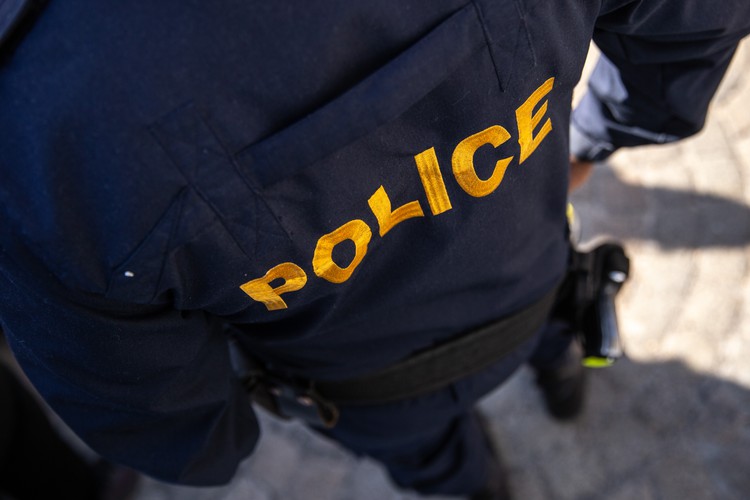Police can’t say why they let an alleged rapist off the hook
Officers dropped him at hospital without questioning him
GroundUp has learnt that shortly after this article was first published on 15 April, the alleged rapist was again apprehended by community members and arrested by police. He was charged with murder and will next appear in the Khayelitsha Magistrates Court on 6 May. Police have said a "disciplinary investigation" is underway into why the person was let off the hook the first time.
Police in Khayelitsha appear to have not followed procedure after apprehending a rape suspect. Archive photo: Ashraf Hendricks
- A woman reported being raped to the Makhaza Police Station.
- The alleged rapist was apprehended by a crowd, beaten up, and then handed over to police officers from nearby Khayelitsha Police Station.
- The officers took the man to hospital but did not inform Makhaza Police Station they had a suspect, nor did they arrest the man.
- The alleged rapist is now free in Khayelitsha and he has neither been arrested nor charged.
The South African Police Service (SAPS) says it is investigating why a person suspected of rape was taken to the Khayelitsha Day Hospital without being questioned.
A young woman says that on 30 March, in Khayelitsha, Cape Town, she was abducted by a stranger and raped several times throughout the night.
The next day she reported the incident at Makhaza Police Station. She gave a statement and was then taken to hospital to undergo an examination and receive post-exposure prophylaxis (PEP) for HIV. She was unable to identify the exact location of the incident.
The day after, on 1 April, the victim’s neighbours said they had spotted someone matching the victim’s description of the perpetrator. The man was known to some of the residents.
The alleged perpetrator was apprehended by residents and taken to a neighbour’s courtyard, where the person was questioned and assaulted by residents. The rape victim told the crowd that this was indeed the man who raped her.
The police were called. When they arrived, the victim’s family told them that the man was suspected of rape and provided the number for the case opened at Makhaza Police Station the previous day.
The officers, who were from Khayelitsha Police Station, took the man with them. It appears that they did not inform Makhaza Police Station that they had a potential suspect.
The next day, friends of the victim’s family saw the man walking in the streets in Khayelitsha. He apparently threatened people not to take further action, and boasted that he would never be arrested.
Police officers told the family that the man had been dropped off at Khayelitsha Day Hospital to receive treatment for his wounds. The victim has not been contacted again by the investigating officer in the rape case.
Western Cape SAPS spokesperson Malcolm Pojie told GroundUp that the Khayelitsha Family Violence, Child Protection and Sexual Offences unit (FCS) is investigating the matter.
“It is alleged that the victim was on her way home when she was accosted by the suspect on Sunday 30 March, who threatened her with a knife and took her to his shack where he violated her during the night. The victim reported her ordeal the next day but was unable to provide or show the location of the crime scene,” said Pojie.
He said, “Rumours that the suspect was at the day hospital for treatment forms part of the ongoing investigation.”
Police appear to have dropped the ball
It seems that when the victim reported the rape, proper protocol was followed: an initial statement was taken and then the victim was taken to hospital for a medical examination. Presumably DNA evidence was collected.
But the police who collected the man after he was apprehended and assaulted by residents seem to have dropped the ball.
Photographs of the alleged perpetrator seen by GroundUp suggest that he was in need of medical treatment after the assault. So it makes sense that the police took him to the day hospital.
But they did not inform the investigating officer of the rape case that they had a potential suspect. Neither were any steps taken to assess whether there were reasonable grounds to suspect the person, such as evaluating the information provided by the residents who apprehended the man.
If there was reasonable suspicion, the police would have been able to arrest him without a warrant.
It appears there was no attempt to question the man, or to collect other evidence from him such as fingerprints, photographs or DNA samples.
Support independent journalism
Donate using Payfast

Don't miss out on the latest news
We respect your privacy, and promise we won't spam you.
© 2025 GroundUp. This article is licensed under a Creative Commons Attribution-NoDerivatives 4.0 International License.
You may republish this article, so long as you credit the authors and GroundUp, and do not change the text. Please include a link back to the original article.
We put an invisible pixel in the article so that we can count traffic to republishers. All analytics tools are solely on our servers. We do not give our logs to any third party. Logs are deleted after two weeks. We do not use any IP address identifying information except to count regional traffic. We are solely interested in counting hits, not tracking users. If you republish, please do not delete the invisible pixel.

